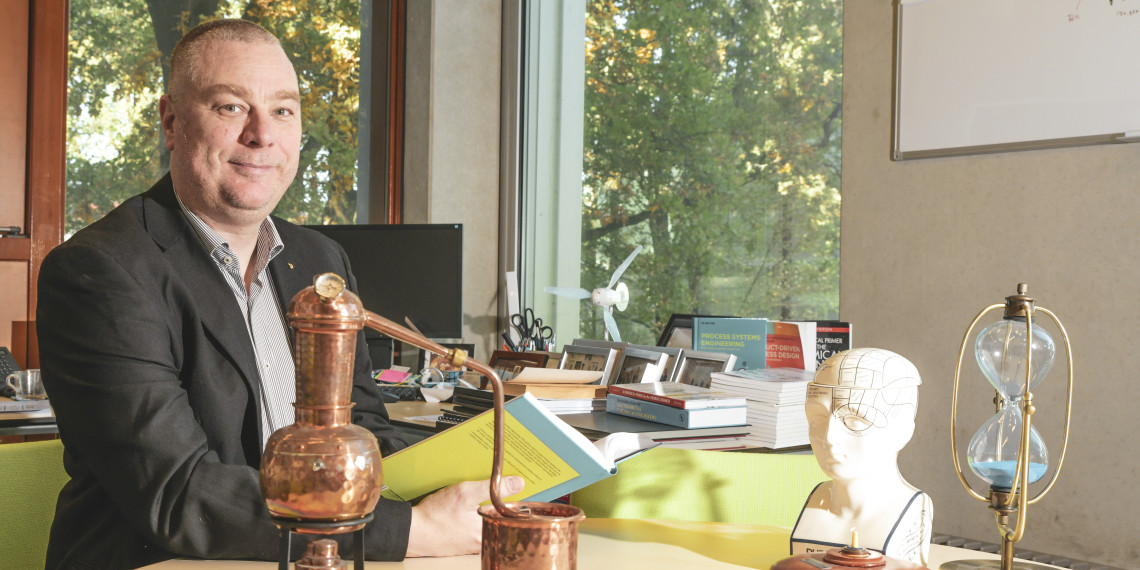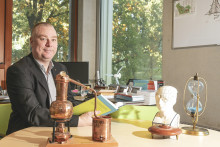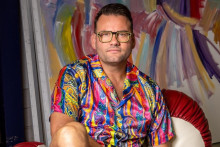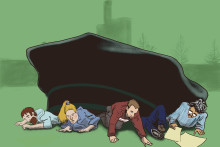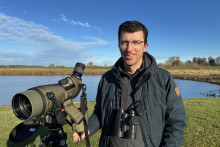His office in the Meander building feels more like a living room. Photos on the wall and in frames on his desk, paintings, drawings, countless trinkets – and a rugby ball on the table. ‘I play rugby with students on the field behind this building every week,’ he says with a laugh. ‘It’s a fantastic sport; I only discovered it recently.’
Discovering new things is clearly one of Zondervan’s strengths. As the conversation progresses, he shows a sketchbook outlining a new lecture for his students. He wants them to work on pipeline calculations, inspired by those used during the Second World War. In preparation for the Normandy invasion, the Allies secretly built a fuel pipeline – Operation PLUTO. To add a bit of flair, Zondervan plans to deliver the lecture in his military reservist uniform. ‘About eight years ago, I decided to take the reservist training course at the Ministry of Defence. Maybe it was a midlife crisis,’ he jokes, ‘but I was mostly curious to see if it would suit me.’
Carpenter’s son
At the age of twelve, Zondervan received a lower general secondary recommendation in 1987. And that was fine, he thought. Young Edwin was a ‘modest boy’ and not immediately familiar with the intellectual world of higher education. His father was a carpenter, his mother a cleaner. ‘So the advice seemed appropriate.’ And it suited him well. A presentation about ‘the laboratory’ sparked his interest. ‘I arranged a tour of a lab and was given a box full of lab supplies. I was absolutely fascinated.’
'I wasn’t exactly your average student'
After secondary school, he pursued laboratory education, followed by a higher professional degree in chemical technology in Leeuwarden, where he graduated with a focus on automation processes. At the University of Groningen, Zondervan completed a master’s in chemical engineering. ‘I wasn’t exactly your average student. In Groningen, I had a strong desire to explore new things – I even studied Slavic languages and history for a while. A whole new world opened up for me.’
The professor he graduated at in Groningen also held a position in Twente and invited Zondervan to apply for a PhD position at the University of Twente.
Not plain sailing
‘A PhD? I was thrilled,’ he says. ‘My parents were a bit hesitant, but also curious about what I was doing.’
However, the journey wasn’t smooth. ‘I hit quite a few roadblocks in the first two years. I didn’t immediately grasp how to conduct research, but I eventually completed my PhD within four years.’ He then became an assistant professor at Eindhoven University of Technology. ‘Since I lacked postdoc experience, I wanted to gain more abroad. I got that opportunity and was able to travel the world.’
Back in Twente
After eight years in Eindhoven, he moved to Bremen, Germany, where he was appointed professor. ‘My family stayed behind, and I commuted for five years – a thousand kilometres each week. You can keep that up for a while, but not forever.’ During the COVID period, Zondervan returned to Twente as full professor of Process Systems Engineering. ‘Of course, a lot had changed – like the building I work in. Meander didn’t even exist when I did my PhD. But much has stayed the same, like the small walking paths across campus.’
'My parents also had the intellect to pursue further education. Circumstances simply didn’t allow it in their time'
Last summer, he shared his journey to professorship in a LinkedIn post, which received many responses. ‘Including from fellow academics who also took a longer – and less conventional – route. Although I always took logical next steps in my development, I realised that the path isn’t so logical if you start with a lower general secondary recommendation. I’m a first-generation student, but my parents also had the intellect to pursue further education. Circumstances simply didn’t allow it in their time.’
First-generation students
Zondervan wants to share his story to inspire current students. ‘I see first-generation students around me, as well as international students from diverse backgrounds – students with backpacks and unique stories. I want to show them that you can achieve a lot, as long as you strive for the best.’
What kept him going was curiosity. ‘That’s why I became a reservist at the Ministry of Defence, for example. I was curious about what it would be like. Right now, I’m exploring how chemical engineering played a role in ancient Egypt and trying to write a publication about it.’
Of course, luck plays a role, he believes. ‘It’s also about being in the right place at the right time and meeting the right people who believe in you – like the professor who invited me to apply for a PhD position. Apparently, he saw potential in me.’
'I’ve worked on all levels and interacted with many different people. That helped me develop socially'
Would his career have been different if he had received a pre-university recommendation? ‘No, I don’t think so. I would have become a professor sooner.’ In any case, Zondervan believes that his path gave him many insights. ‘Because I’ve worked at all levels, I’ve interacted with many different people. That interaction helped me develop socially.’
His advice to today’s generation of pupils and students? ‘Chase your dreams.’ ‘A school recommendation reflects a particular moment in your life, but says nothing about your destination.’


